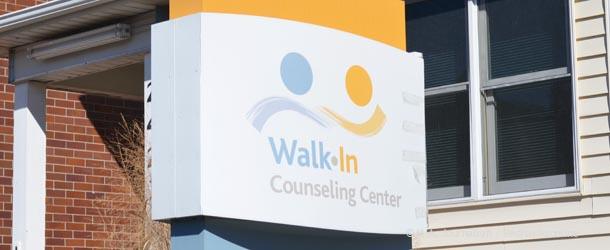Minnesota nonprofit clinic Walk In is working to make counseling a tool accessible to all
An estimated 43.7 million adults are living with mental illnesses in the US, according to the National Survey on Drug Use and Health (NSDUH) done in 2012. Nearly half of children under 18 have had or currently have a mental disorder according to the same survey. However, only about half of adults and children with mental illnesses receive care. For some, the reason is financial. For others, privacy. Regardless of the reason, a 45-year-old Minneapolis clinic offers a solution.
“Our mission and our practice today is the same as it was in 1969 and that is providing free mental health services with no barriers,” said Mary Weeks, Executive Director of Walk In, a local free and anonymous counseling clinic. “We don’t ask for identification. You can be anonymous if you want to. During our Walk In clinic hours, you don’t need an appointment. Just walk in.”
A senior at Minnehaha Academy has experienced the ins and outs of therapy as she treated her depression. After years of treatment, she sees therapy’s importance.
“When you have a mental health issue that’s interfering with your life,” she said, “whether you realize it or not, therapy can be an enormously beneficial experience by giving you a time each week to face your problems head-on.”

Walk In Counseling Center stands on Chicago Avenue in Minneapolis where it has been since the purchase in 1969. Photo by Maddie Binning.
In 1969, a group of medical professionals, the Minnesota Chapter of Psychologists for Social Action, decided that free mental health support was imperative. The increasing number of runaway youth that had begun to gather on the West Bank spurred the creation of Walk In counseling center, a free clinic with complete anonymity. Other programs such as the Youth Emergency Services (YES) hotline and The Bridge for Runaways House were implemented to support Minneapolis’ struggling youth.
Today, Walk In supports people across all ages and demographics and is run almost entirely through volunteers.
“It started and continues based on volunteer clinicians doing the work,” said Weeks. “We have about 180 volunteers. Most of them [are] clinicians doing the counseling.”
The counseling centers found in both Minneapolis and St. Paul run with the help of clinicians, team consultants and receptionists, such as University of Minnesota freshman and Walk In volunteer Kayla Hanszek-Brill.
“I read about their mission,” said Hanszek-Brill, “and I saw it was the type of organization I wanted to be a part of. It’s apparent that [the volunteers] love working in the mental health field and that they have a heart for making it accessible to everyone. I love seeing others who care so much about ensuring that mental health care is readily available.”
As the business runs through volunteers, clients are able to receive counseling completely free. Walk In has provided approximately $20 million worth of service in the last 45 years, as estimated by the clinic using clinicians average salaries and the number of hours served by volunteers. For Hanszek-Brill this is essential.
“Offering free services for mental health care is really important,” said Hanszek-Brill. “Often, I think people see issues like depression, anxiety, bipolar disorder, eating disorders and addiction as issues only seen in middle and upper classes. But mental illness does not discriminate.”
Recent health care legislation hasn’t made the situation better for everyone.
“While the [Affordable Care Act] now states that all Americans will have insurance, insurance companies don’t always cover mental health care well,” said Hanszek-Brill. “Free services like Walk In can then provide what isn’t covered by insurance, like talk therapy. Walk In allows patients to be completely anonymous, so victims of abuse can seek therapy and resources without anyone else ever having to know.”
Weeks also sees the importance of care without the complication of insurance.
“Because we’re free and we don’t ask for identification,” said Weeks, “we can’t take insurance, so people don’t have to worry about finding a place that takes insurance and now even with some expanded medical care, it takes weeks sometimes to get an appointment, so at Walk In you can wake up at 9 o’clock in the morning and see someone at 1 o’clock in the afternoon.”
Walk In has allowed a number of people to face their personal issues anonymously, which helps to protect victims of domestic abuse as well as individuals whose careers would be in jeopardy if they were openly attending therapy.
Walk In has won a number of awards, including being named a top nonprofit in 2013 by Philanthropedia, an organization dedicated to finding the best nonprofits. Walk In has also contributed to changes in health care across the country, acting as a model for a study by the Joint Information Service (JIS) of the American Psychiatric Association and the National Association for Mental Health.
Despite the awards they have received, effectiveness can often be hard to measure in mental health services, those who work at Walk In can see the impact despite the fact that many of their clients are there on a short term basis.
“We’re not here to be with someone forever, and when that counseling ends in five or 10 sessions, we believe and we can see that the person got better,” said Weeks. “They’re better able to cope. They know the resources. They know where they can go for help the next time something crashes in around their heads.We know that it makes a difference.”
The Minnehaha senior understands the value of available care.
“The idea behind the Walk-In and centers like it is great,” she said. “People who need help can come here to get it. I would absolutely recommend a service like this to friends. Therapy can be so beneficial, and the fact that counseling at Walk In is free makes it accessible to everyone.”

